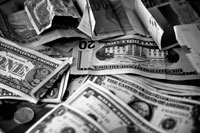Elizabeth Johnson is an intern in Transparency International’s Research and Knowledge Department
The 2011 turmoil in the Middle East and North Africa has illuminated the issue of stolen assets. The publicly available figures on this issue are startling, even while concrete numbers have been difficult to find because monies are moved illicitly through shadow operations which prevent their tracking and are thus open to speculation.
How much money is estimated to have been stolen by leaders of the Arab spring countries?
At the upper end of the scale, some experts believe that Egypt’s former leader, Hosni Mubarak’s net wealth is between US $40 billion and $70 billion, more than Bill Gates the founder of Microsoft is worth. Karly Crucio, an economist with Global Financial Integrity, claims that more than $6 billion of Egypt’s financial resources were lost to illicit flows per year between 2000 and 2008, accumulating in losses of $57.2 billion from Egypt’s state funds.

photo: khrawlings
During the 23-year long dictatorship of Tunisian leader, Zine el-Abidine Ben Ali, his extended family are believed to have siphoned off one-third of the Tunisian economy through corruption and fraud. With the Tunisian economy standing at $44 billion, this means that Ben Ali and his cronies controlled almost $15 billion.
The total assets held by Libya’s sovereign wealth fund, the Libyan Investment Authority, established by Libya’s former leader, Colonel Gaddafi and his son Seif-al-Islam, in 2006, is believed to total $65 billion, according to an LIA report from late 2010.
Less has been uncovered about potential stolen assets by the Syrian leader, Bashar Al-Assad and family. In response to Assad’s policy of violence and repression however, Switzerland has blocked Syrian assets worth $32 million.
According to Abdul Ghani-Iryani, a Yemeni development analyst, Yemen’s leader, Ali Abdullah Saleh, and his cronies have been skimming $2 billion a year for private gain over the last few decades – money stolen from the fuel-subsidy programme that uses up to 10% of Yemen’s GDP. Moreover, estimates for the family holdings of the Yemeni leader run well into the billions, much of it held overseas.
The private wealth of the Moroccan royal family is estimated at £2.5 billion (approximately $4 billion) by the financial magazine, Forbes, which makes King Mohammed IV one of the richest royals in the world. This is at least in part due to his stake in Morocco’s largest conglomerate, ONA, a phosphate producing company.
Every Saudi Arabian royal receives a huge monthly stipend, uncovered by WikiLeaks in 2010, on top of the $10 billion, skimmed from state money and controlled by a few key princes in an ‘off-budget’ programme. Moreover, spending by the Saudi royals became the subject of much controversy in 2008 following allegations of corruption connected with the signing of a $43 billion deal with the British arms manufacturer, BAE systems.
Recent unrest in Jordan has stimulated discussion on alleged looting of public funds and corrupt political practices in the country, with the disenfranchised groups calling for an end to the corruption, nepotism and bureaucracy that is polarizing the wealth between rich and poor. Particularly in the spotlight is Queen Rania, who is known for her lavish lifestyle and fashion credentials.
The figures that these leaders have allegedly plundered are stark when compared to the miniscule amounts that many people in each country survive on daily. For example, Adel Iskander, Egyptian-Canadian lecturer on Middle Eastern media at Georgetown University, argues that Mubarak and family are out of touch with the Egyptian population, “the majority of which live under the international poverty line of $2 a day.”
What have Western countries announced regarding their holdings?
The Obama administration has frozen $37 billion in Libyan assets, whilst Britain impounded the equivalent of £900 million worth of Libyan currency associated to Gaddafi, and also announced the release of £100 million to the Libyan opposition – money that may have been held for Gaddafi in UK banks. Germany also noted that it would lend €100 million to the Libyan opposition to ease growing humanitarian crisis in rebel-controlled parts of the country – money that may also have been held for Gaddafi in German banks.
Switzerland has identified $1 billion worth of assets from dictators whose countries were part of the Arab Spring movement. The Swiss president and foreign minister Micheline Calmy-Rey said that the assets include 360 million Swiss francs that may belong to Gaddafi or his associates; 410 million Swiss francs of the former Egyptian president, Hosni Mubarak; and, 60 million Swiss francs of Tunisia’s ousted leader, Zine El Abidine Ben Ali.
With such a systematic abuse of power, it appears that not only are dictators unexceptionally embroiled in criminal activity involving the stealing of public monies for private gain, but that Western banks are all too often complicit in the harbouring of these illicit accounts.















 Connect with us on Facebook
Connect with us on Facebook Follow us on Twitter
Follow us on Twitter